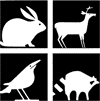Center, Internet, Wildlife Damage Management

Wildlife Damage Management Conference Proceedings
Date of this Version
2013
Document Type
Article
Citation
Proceedings of the 15th Wildlife Damage Management Conference. (J. B. Armstrong, G. R. Gallagher, Eds). 2013. Pp. 7.
Abstract
Having been both a university researcher and an administrator for a methods development laboratory focused on creating solutions to address human wildlife conflicts, I have acquired an appreciation for multiple perspectives on the role of research in the field of wildlife damage management and have first-hand experience with the never-ending debate over whether to utilize some of our limited resources to invest in wildlife research or to fully use those resources to address the most pressing wildlife issues of the day. This debate is particularly relevant nowadays, for in times of budgetary stress, research of any type often is viewed as a luxury that can be reduced in favor of on-the-ground, applied needs associated with very real societal, political, and economic demands. In reality this situation is no different from similar, ongoing debates that pit funding for education and other investments in our future versus those societal issues and needs perceived to be more relevant today. In both scenarios, loss of funding for investments in our future have the potential to bankrupt our society of the innovative technologies needed to address emerging needs and/or of the highly trained and educated workforce needed to use these technologies. In times like these, we need to be reminded of the wisdom of our predecessors, those who took the long view and invested in our future by devoting resources to support research that produced technologies that we take for granted every day. The goal here is to remind us of the value of these investments and point to the emerging challenges in wildlife damage management. I also hope to challenge researchers in the field of wildlife damage management to take the long view themselves and to think about how to provide the innovative solutions that will be needed tomorrow rather than simply describing what we do today.

